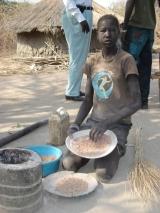FEATURE: Girls education become so critical in Sudan’s Lakes
By Manyang Mayom
July 18, 2007 (RUMBEK) — Girls education in Lakes state as well as the rest of the southern Sudan with the peace has become an important factor for economic and social development. However, with the poverty parents minimize the importance of education and choose early marriage as strategy of survival. But, before the marriage, families prefer keeping girls for cooking food instead of sending them to schools.
 Lakes State has an estimate of 93,900km. It has eight (8) Counties with 52 Payams and an estimated population of 1,276,381 million people. About 57% of these are children of school going age. The State has 283 functioning basic schools, most in the open (under trees). Students’ enrollment status, the enrollment standard at 107,384 children (84,384 boys and 22,648 girls) enrolled to schools in the 283 schools (the first wave of registration – April – May 2007). Net figure might changes as enrollment is therefore only 15% of children of school going age. However, this figure might change as enrollment drive continues during the year. The ministry plans to enroll 120,000 additional children to school in 2007.
Lakes State has an estimate of 93,900km. It has eight (8) Counties with 52 Payams and an estimated population of 1,276,381 million people. About 57% of these are children of school going age. The State has 283 functioning basic schools, most in the open (under trees). Students’ enrollment status, the enrollment standard at 107,384 children (84,384 boys and 22,648 girls) enrolled to schools in the 283 schools (the first wave of registration – April – May 2007). Net figure might changes as enrollment is therefore only 15% of children of school going age. However, this figure might change as enrollment drive continues during the year. The ministry plans to enroll 120,000 additional children to school in 2007.
In Dinka Agar traditionally, Girls are kept at home or cattle-camp to guide children and animals” in Lakes state community girls are still kept for neither generating wealth resources nor sending them to schools. Few girls in Lakes are sent to school by their parents and still those girls in schools are facing difficulties from their age-mate at cattle-camp, telling them that you are already adultery girls who will make no progress in Sudan.
“Early marriages in Lakes also become too much abusing girls educations”.
90% in schools are boys in Lakes while 30% are girls’ underage attending classes with boys, the state minister for education, science and technology H.E. Gordon Maker Abol said that girls’ education in Lakes state must to be encourage with full power of whoever call herself sons/daughters of Rumbek. Let us educate our girls so that we must feet ourselves to the world of coming three generation millennium because it is too late for us now to feet in.
In some areas around Lakes State and one finds that girls are still kept on hard time working and cooking food to their family. Girls in Lakes are not events respected by their own parents at home. Boys in Lakes become most powerful in the community of Lakes presentation since the government of Lakes state was put in action structure in 2005; there is no signal girl that had presented a poem or any concerns for girls to present her right at the front of community in Rumbek Freedom Square.
Women also become new subject to Government of Lakes State presentation as well the State minister for information, Culture, Youths and Sports is only a women presenting in executive State council of ministers and Lakes State Interim Legislative Assembly is only composed with 12 women while other three (3) women from Others Southern Sudan political party, including SPLM eight (8) women members “ Said Mary Barnaba a member of Interim Lakes State Assembly, chairperson of the specialized committee for Information.”
The match majority of Girls in Rumbek are under their family control.
Peace in southern Sudan turns people’s thoughts to marriage and investment — both of which traditionally involve giving, or keeping, cows. For the government, the cows are proving too much of a good thing. Parents-in-law are demanding cows promised as bride-price during the long war years, and this together with a sudden increase in ready cash has sent the price of cattle sky high. But the Sudanese are in the habit of keeping — not selling — their cows, and as traders in neighbouring Uganda take advantage of higher prices to sell their cattle into Sudan, the huge influx is creating a trade deficit, encouraging cattle-rustling, and damaging pastures.
The authorities are trying to change people’s attitudes and encourage them to turn to profit-based herding and to sell off surplus cows at regular intervals to make money. It is not an easy task. Through decades of war, cows were one of the few stores of wealth for many people, especially the descendants of pastoralists who lived off their milk, blood or meat and counted a man’s wealth by the size of his herd. “You have to pay cows for marriage, you cannot get it for free or money.
The inflow of cash that peace has brought, combined with a backlog of demand for cows as bride-price, has pushed up prices and reversed a previous flow of cattle out of Sudan to Uganda. Since the January 2005 peace deal Sudanese have imported cows in unprecedented numbers, authorities say.
(ST)
